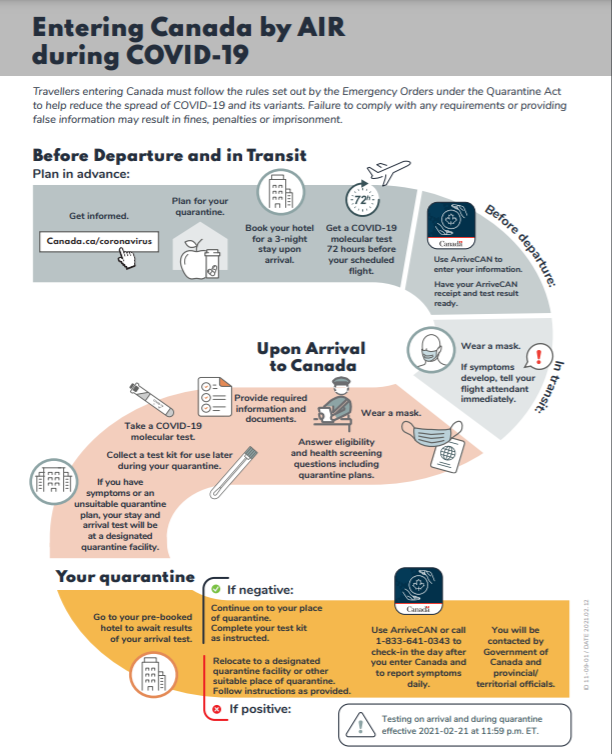Travellers to begin mandatory hotel quarantine measures on Feb. 22, Trudeau says
Posted February 12, 2021 11:59 am.
Last Updated February 12, 2021 6:25 pm.
Prime Minister Justin Trudeau has unveiled when the country will begin to enforce its rigorous restrictions for travellers as it will become mandatory for everyone arriving in Canada to quarantine in a hotel starting Feb. 22.
Trudeau announced that air travellers will need to take a COVID-19 test at their own expense and subsequently pay for a 72-hour stay at a hotel approved by government officials.
“Putting these additional measures in place is a true team effort,” said the Prime Minister. “To Canadian airlines and border agents, thank you. To public health employees to hotel workers and owners, thank you, for all the work you’re doing and doing your part.”
When the round of travel restrictions was first announced on Jan. 29, Trudeau said travellers will need to remain in these selected hotels until results come back, which could take around three days and cost them close to $2,000.
Those with negative test results will be able to then quarantine for the remainder of the mandatory two weeks at home, while those with positive tests will be required to quarantine in designated government facilities.
Trudeau says there will be exceptions for some essential workers but says no one should be travelling for any non-essential reason right now.
Failure to comply with any requirements or providing false information may result in fines, penalties, or imprisonment, the feds say.
RELATED: Snowbirds in pandemic hot seat with Canada’s latest travel restrictions
Canada already requires those entering the country to self-isolate for 14 days and to present a negative COVID-19 test taken within three days before arrival. The new measure will require specified travellers to isolate themselves at a hotel rather than at home.

Public Safety Minister Bill Blair says there has been a dramatic drop in the number of non-essential travellers since the announcement was first made.
“The message is also becoming quite clear that now is not the time,” Blair said.
“I think many Canadians have listened to that message, understand the concern of their fellow citizens about the nature of that travel and the potential consequences of it, and are making the right decisions.”
Canada has also since suspended all flights to the Caribbean and Mexico until April 30.
On Tuesday, Trudeau announced that anyone arriving through the U.S.-Canada land border will be tested for COVID-19 and must produce a negative result upon entry.
This will be enforced starting February 15.
Ontario’s mandatory airport testing began on Feb. 1 with the province and Ford government pressing for a quicker response in an attempt to further control the spread of variants, such as the one first discovered in the UK.
Trudeau also announced that Canada is expected to secure roughly four-million doses of the Pfizer-BioNTech vaccine by the end of March.
Between April and June, Canada should receive an additional 10.8-million doses of Pfizer’s vaccine, Trudeau added.
Canada’s chief public health officer said provinces and territories must not let their guard down against COVID-19, particularly as more serious variants of the novel coronavirus are circulating. Doctor Theresa Tam says speeding up vaccinations will help.
“Vaccination will catch up to the variants if the vaccines remain effective,” she said Friday. “Escalating vaccine coverage is an extremely important part of the response right now.”
As of Friday, Ontario is reporting a jump in cases of the B.1.1.7 variant first detected in the UK with 39 more confirmed cases than a day ago.
The province recently confirmed the first case of South African and Brazillian variants.
With files from Stephanie Levitz of The Canadian Press










